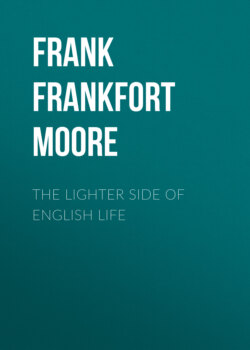Читать книгу The Lighter Side of English Life - Frank Frankfort Moore - Страница 6
На сайте Литреса книга снята с продажи.
Оглавление
That is our village down to the ground. You could not persuade one of the aborigines that there is any place in England or outside it of greater importance than Thurswell, because there is no place of greater importance to the Thurswellian. An aged inhabitant was taken by his son to see the coronation procession, and when he was asked what it was like, replied, after a suitable pause, that it ran Thurs-well's Day very hard—Thurswell's Day is the name given to the First Sunday after Trinity, when the Free Foresters and Ancient Shepherds march to church in sashes, with a band made up of a fife, three flutes, a drum, a concertina, and a melodion.
“Ay, neighbours, it ran Thurswell's Day hard,” he affirmed, and did not flinch from his statement in spite of the incredulous murmur that arose from the bench nearest the door, which was immediately suppressed by the landlord, who was apprehensive of a riot.
Thurswell is a village of antiquity. Its name occurs in Domesday Book, where you may look in vain for any mention of Brindlington, that mushroom town of 60.000 inhabitants, which is nine miles to the north, or even of Broadminster, the Cathedral town, which is seven miles to the west. “Broadminster is where the Dean lives,” I was told by the landlord of the Wheatsheaf at Thurswell when I was making inquiries about the district, “and Brindlington is where the brewery is; but my father got his ale at Pipstone, and I get mine there too, though it's a blow to Brindlington, for in harvest the best part of a cask goes within a week.”
There are several other villages within a mile or so of Thurswell, and the inhabitants of some are infatuated enough to believe that they are on a social, as well as a commercial, level with the people of Thurswell. This singular hallucination caused a good deal of friction on all sides in years gone by, and the rapprochement that was eventually brought about between Thurswell and its neighbours by the thoughtfulness of a Rector, who preached a sermon on the vision of St. Peter and enjoined upon his hearers to remember that even though people have not been born in Thurswell they are still God's creatures, was a purely sentimental one, and did not last.
Some years ago an article appeared in the Topographical Gazette from the pen of an eminent archaeologist affirming that Thurswell must originally have been Thor's Well, so that the place dated back to the time of the worship of the Scandinavian god Thor; but while this evidence of its antiquity was received by some of us with enthusiasm—having been a resident in the village for a whole year I was naturally an ardent Thurswellian—it was, when reproduced in the East Nethershire Weekly, generally regarded as the invention of some one anxious to give the enemies of the village some ground for their animosity toward it. For the suggestion that it had a heathen origin was not one, it was felt, to which its people could tamely submit. There was some talk of a public meeting to protest against the conclusions come to by the archaeologist, and the Rector was considered in some quarters to be but a half-hearted champion of the Faith when he refused to lend the schoolhouse—sixty people could be crowded into it—for this purpose, his argument that the more heathen Thurswell had been in the past, the more marked should be its display of the Christian virtue of charity in the present, being criticised as savouring of Jesuitry. For months the matter was the leading topic of the neighbourhood, and the Hearts of Oak Habitation of the Ancient Shepherds drew up a resolution protesting in this connection against “archaeology and every form of idolatry.” It was the misprint in the Gazette that changed “Hearts of Oak” into “Heads of Oak” in publishing the proceedings that quenched the violence of the discussion, and now it is considered bad taste to refer to it at all.
